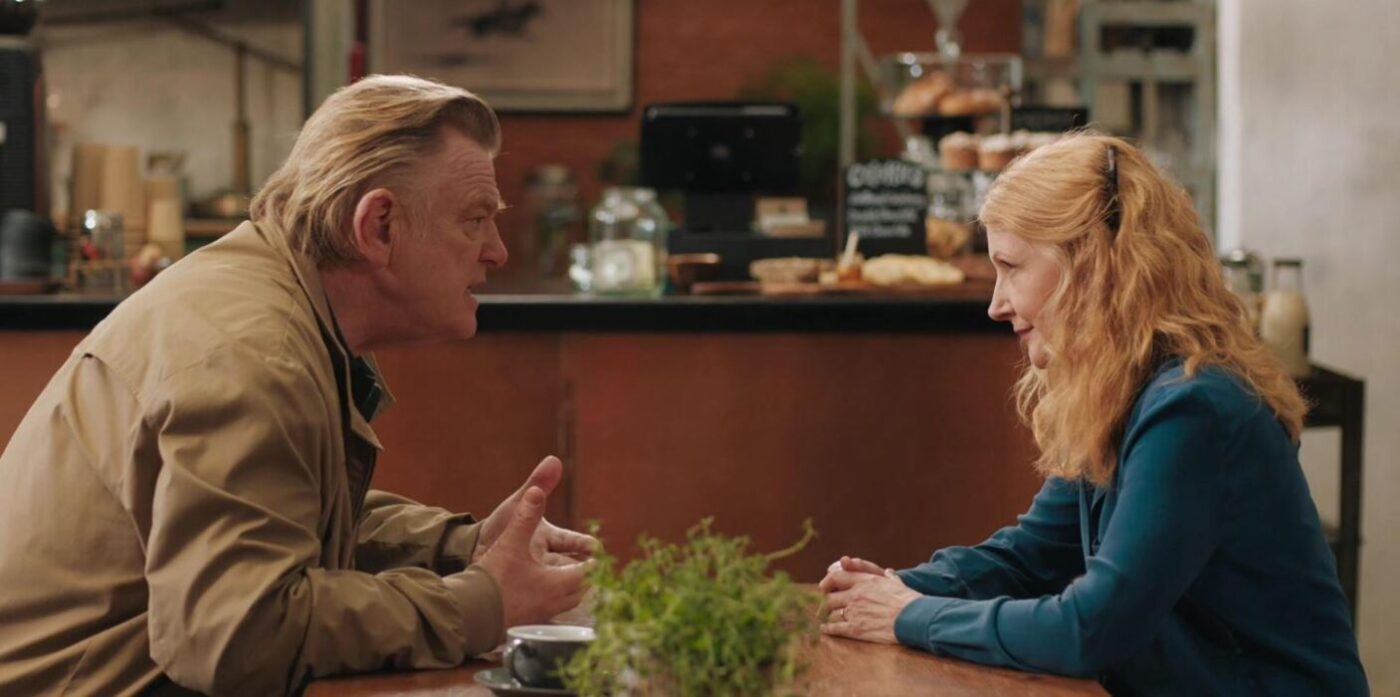| Worth seeing: | for the snappy dialogue and tight performances in Stephen Frears and Nick Hornby's bite-size and moreish marital drama |

| Featuring: | Brendan Gleeson, Chris O'Dowd, Patricia Clarkson, Rosamund Pike, Aisling Bea, Elliot Levey, Esco Jouley, Gretchen Egolf, Hari Dhillon, Janet Amsden, Jeff Rawle, Laura Cubitt |
| Key crew: | Stephen Frears, Amy Jackson, Sophie Reynolds, Nick Hornby |
| Channel: | BBC iPlayer, BBC2 |
| Length: | 10 minutes |
| Episodes: | 2 seasons of 10 episodes each |
| Broadcast date: | 22nd May 2022 (Season 2) |
| Country: | UK, US |
WHAT’S IT ABOUT?
Marriages don’t always go smoothly and many couples resort to counselling when things get tough – perhaps to try to save the relationship, or maybe to bring things to a close in the most amicable way possible.
State of the Union follows two couples – one in each season – as they meet briefly for a drink, each week, before their therapy sessions.
In Season One, a young UK-based couple, Chris O’Dowd and Rosamund Pike, meet in the pub across the road from their counsellor.
In Season Two, an older US-based couple, Brendan Gleeson and Patricia Clarkson, meet in the cafe below their therapist’s office.
As the weeks go by, the informal, unguided chats the couples have before their sessions are perhaps more revealing and useful than the formal, guided discussions that follow, in helping them reach the right outcome for them.
WHAT’S IT LIKE?
There must be something in the air. Long gone are the days when TV was about happy couples and families or the start of relationships – these days, many of the most recent dramas coming from the BBC revolve around extra-marital affairs or the end of marriages.
Most recently, Conversations With Friends featured an actor’s relationship with his author wife being put under strain by an affair with a young writer, The Split was about the breakdown of a relationship among divorce lawyers and Cheaters, in which a one-night stand turns into a full-blown affair when the married individuals realise they are neighbours.
In 2019, writer Nick Hornby and director Stephen Frears first turned their hands to the short-form format, scooping Emmy awards in the process, as Chris O’Dowd’s Tom and Rosamund Pike’s Louise discussed their relationship – and much more besides – as they waited for the couple before them to finish their counselling. We liked them. We believed in them. We felt for them. We pitied them. We laughed with them. Sharp dialogue, precise direction and snappy performances lifted the situation off the screen and the bite-size format invited binge-watching and ensured that the pace never lagged; in ten minute long episodes, you don’t have time to drop the ball.
The writer and director team have now taken the idea and transferred it to the US – the younger couple replaced by an older one – the pub across the road replaced by the cafe downstairs. The dialogue is no less sharp, the direction no less precise, the performances no less snappy. But somehow this time, the characters and their arcs are less convincing. And rather than concentrating on the couple themselves, this time, there’s almost as much screen time for the barista, who serves as a maguffin to nudge the couple towards their inevitable conclusion.
The characters in the first series felt like a real couple – real people – but those in the second feel like neither. Rather than genuine individuals with authentic lives, we have archetypes designed for the sole purpose of creating tension; Brendan Gleeson’s Scott is an old-fashioned husband, whose views of the world haven’t changed since the 1970s, while Patricia Clarkson’s flighty, woke, new-age Ellen has recently found religion and wants to give up all her earthly wealth to live a simpler life. These people might have been married thirty years ago, but could they really have changed this much and only recently noticed this? And if these pre-therapy chats – and the counselling – can’t do anything to narrow the gap between them, are we supposed to think that the barista can?
While they can be equally enlightening, many of the conversations this time around seem more arch, less authentic. The artifice seems to have worked better first time around, but this time, there’s enough discussion about what happens between their weekly meetings to realise that the future of their marriage doesn’t really depend on the outcome of their counselling at all. And while we see Scott dragged into the 21st Century, we’re supposed to respect Ellen for not budging an inch – if anything, moving backwards.
In both seasons, the ten-minute long episodes invite the binge-watching experience, but while with Tom and Louise, we want to zip through to find out what happens to them, with Scott and Ellen, we just want to get to the end more quickly. Season 1 is a dessert you want to savour and enjoy and leaves you feeling enriched – season 2 feels more like a rich pudding you just want to get to the end of so that you can put the plate in the dishwasher and move on.
Season 1 is a strong **** but season 2 is more of a questionable ***. So we’ll even it out to three and a half.
